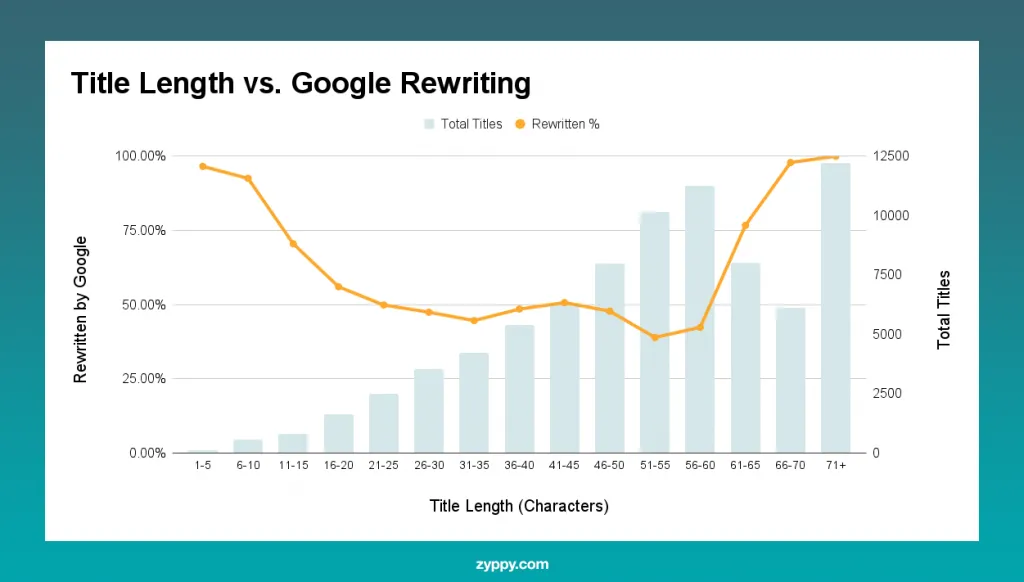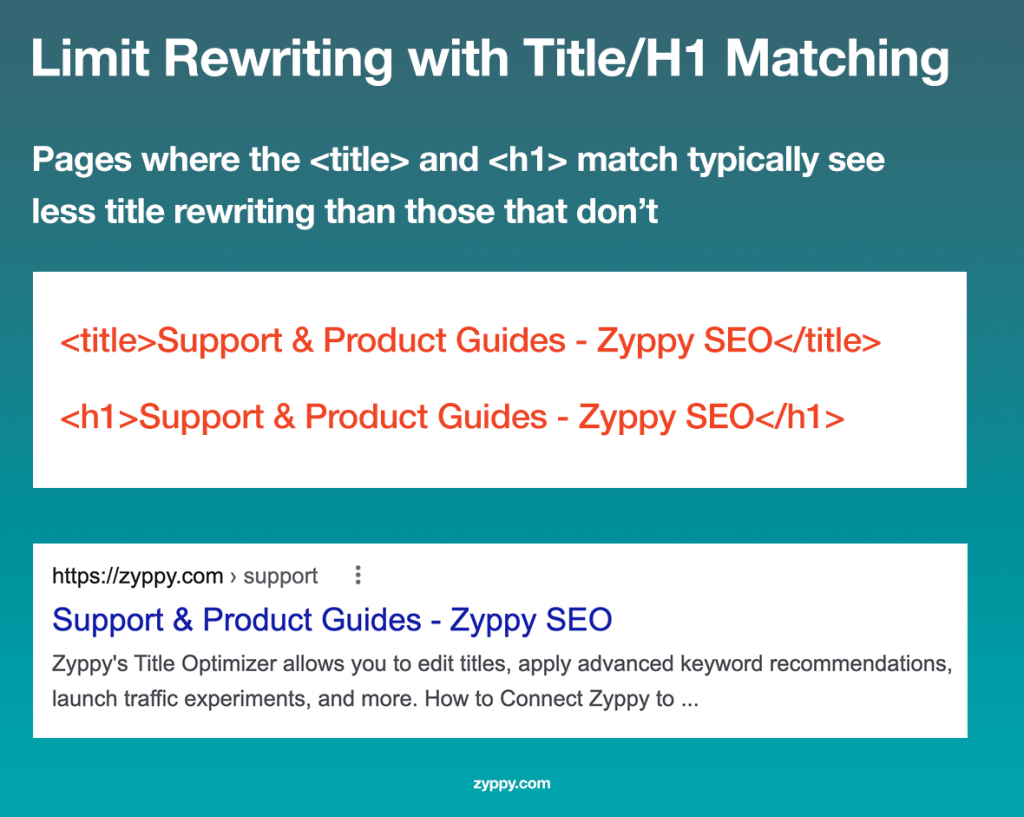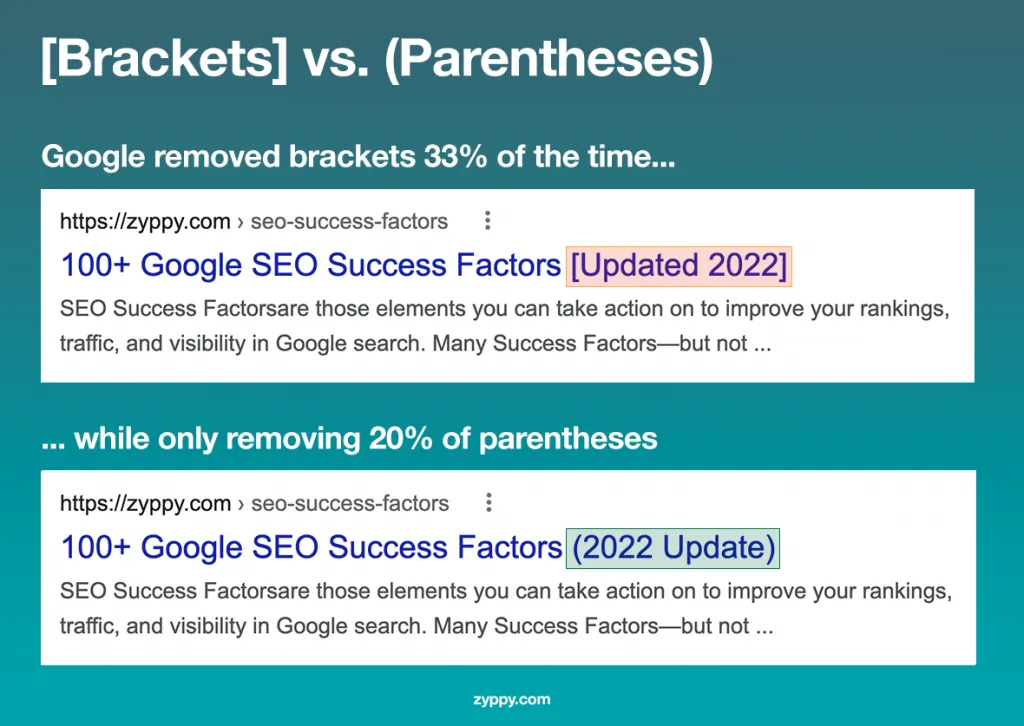What To Do When Google Overwrites You
Google’s practice of rewriting page titles for display in search results—which they call “title links”—is nothing new. They started doing this nearly ten years ago but recently became much more aggressive.
Even the Shrug Emoji Person couldn’t be saved after losing their entire right arm to overly-aggressive Google rewriting.
¯\_(ツ)_/¯ (Fortunately, Google has since restored the arm.)

A recent study by Zyppy showed Google rewriting nearly 61% of page titles. Many of these are minor rewrites, such as adding a brand name.
In other cases, the rewrites create a more significant impact.
Google often has good reason to rewrite titles, which they’ve documented for all to read. Still, you’ve put a lot of work into your title tags, and for the sake of accuracy, marketing, legal, or plain aesthetics, you might cringe to see your masterworks rewritten in search results.
At the very least, if Google isn’t displaying your title the way you intended, you should at least know about it.
Here, we’ve compiled 10 of the most common scenarios in which Google is likely to rewrite your titles, along with strategies to beat them, so your title tags are more likely to display exactly how you want them.
Keep Your Title Length In Check
The biggest takeaway from our study of 81,000 titles is title length causes more Google rewriting than any other reason.
Many SEOs know that Google’s desktop results have a display limit of 600 pixels. If your title reaches longer than that, Google will almost certainly rewrite it – often simply cutting it off in an awkward place.
What many don’t realize, however, is Google also tends to rewrite short titles as well. The graph below shows Google rewrites both extremely short titles and long titles alike over 95% of the time.

Keep in mind that Google’s mobile results can differ wildly from its desktop results. It’s not unusual to see your complete title displayed on mobile and a completely different result on desktop – often with a changed meaning.

This illustrates why you want to know exactly when Google rewrites your title. The title you thought searchers were seeing has been replaced by something completely different.
Not only do shorter titles help prevent Google rewriting, but shorter titles also appear to help with traffic as well, based on several studies.
Strategy: To prevent Google from rewriting based on length, we recommend titles between 51-60 characters in length. This seems to be the “sweet spot” where Google rewrites the fewest number of titles.
Match the Title Tag to the H1
When formulating title links, Google claims to start with your HTML title tag up to 87% of the time_. That said, they may also use other HTML elements, especially any H1 headings they may find.
Frequently, title tags will match a page’s H1 heading. Or at least, pretty close, like this:
<title>Support & Product Guides - Zyppy</title>
<h1>Support & Product Guides</h1>
When the title is different than the H1, Google may choose to use the H1 instead. This is especially true if Google thinks the title tag is too “markety” or isn’t as relevant.
<title>10 Greatest Product Support Guides to Help Increase Traffic - Zyppy</title>
<h1>Support & Product Guides</h1>

Strategy: In our study, we found that “matching your H1 to your title typically dropped the degree of rewriting across the board, often dramatically.“
Don’t Break the Title Into Sections
It’s common to break your title tag into sections, such as in this example:
<title>Best TVs 2022 - Reviewed by Experts (& User Tested)</title>
While titles like this can be great for grabbing the user’s attention, they also create an opportunity for Google to break the title up and rewrite it. Google could break the above title into three sections:
- Best TVs 2022
- Reviewed by Experts
- (& User Tested)
Google is much more likely to rewrite titles that are broken up into sections than those that aren’t. For example, when a title is too long, Google may eliminate the section it considers least relevant.
If you find Google doing this, one strategy is to simply write your titles in one long sentence, like this:
<title>Best TVs of 2022 Reviewed by Experts & User Tested<title>
Strategy: If Google is rewriting your titles by separating them into easily discernable sections, simply try writing the title without breaking it up.
Use the Right Title Separator
In many cases, it’s simply practical to break your title into sections using separators. Common separators include:
- – — : · • * ⋆ | ~ « » < >
What many people don’t realize is Google prefers certain separators over others and is more likely to replace and rewrite certain separators.
Google’s favorite separator appears to be a simple dash “-“.
Our analysis showed that when dashes are used as separators, Google only rewrote and removed the dashes 19.7% of the time. By comparison, when pipes “|” were used, Google rewrote and removed the pipes a whopping 41% of the time.
Strategy: The simple dash is typically your best bet when choosing title separators.
Use Parenthesis Instead of Brackets
Along with separators, Google also prefers (parenthetical) text to [bracketed.]
Wait, what?
Consider these two titles:
Top TVs Reviewed by Experts [Updated for 2022]
6 Ways to Solve Wordle (+2 That Don’t Work)
In our study, we found that Google rewrote titles with [brackets] an incredible 77.6% of titles. Worse, Google completely removed the bracketed portion of text 32.9% of the time.

On the other hand, Google only rewrote titles with (parenthesis) 61.9% of the time, completely removing the parenthesis section of text only 19.7% of the time.
Strategy: To play it safe, always favor using (parentheses) instead of [brackets.]
Use Keywords That Match User Search Queries
Google is more likely to rewrite titles it finds generic or irrelevant. That’s because it wants titles that accurately describe the page and match what the user is looking for.
Consider you run the popular Blueberry Lollipop Ice Cream Company, but you forgot to update your homepage title tag, so it simply says “Home.”
Searchers for “Blueberry Lollipop Ice Cream” wouldn’t recognize your search result, so Google would likely rewrite it.
Your title: Home
Google Title: Blueberry Lollipop Ice Cream Company
The simplest way to ensure your titles are relevant is by using keywords that closely match how users find your page in Google search results. For established ages, you can simply use Google Search Console Performance Report to find these keywords for every URL.
You can also use tools like the SiteSeer.io title optimizer to identify missing relevant keywords for every page, as seen below.

Strategy: If Google is rewriting your title, check the top keywords users search to find the page, and be sure to include them in your title.
Avoid Repeating Keywords in the Title
Google calls it “keyword stuffing,” but it goes far beyond that today.
“Stuffing” traditionally refers to repeatedly cramming the keyword into a piece of text in ways that appear spammy.
Now, Google is more likely to rewrite your title if you repeat a single word.
This can create headaches if your brand name contains a crucial keyword, e.g., “Mattress Discounters,” and Google keeps removing your brand from the SERPs. In these cases, it’s often better to use variations and synonyms for your main keywords to get past Google filters.
Bad: Mattress Sale - Find Your Perfect Mattress - Mattress Discounters
Better: Mattresses For Sale - Find Your Perfect Bed - MattressDiscounters.com

Strategy: Try to avoid repeating any keywords, including your brand if possible, in your title. Use synonyms and variations whenever you can.
Avoid Irrelevant Boilerplate In Your Titles
“Boilerplate” is any non-unique text used repeatedly across multiple pages. Types of boilerplate in titles include:
- Brand names, especially lengthy ones added to every title: “- Harry Marshall School for the Ninja Arts NYC”
- Category information: “- Cheap Books for Sale”
- Marketing Copy: “- Best Clothing Company on the Planet”
When Google finds that your boilerplate is irrelevant or clouds the main message of the page, they are more likely to rewrite it.
One way to tell if the boilerplate text is relevant to your title is simply to see if it contains keywords your visitors are looking for. Here’s an example from SiteSeer.io title optimizer identifying boilerplate text that Google may find irrelevant.

Strategy: Boilerplate text by itself isn’t bad, but try to avoid it when it’s irrelevant to what your users are searching for or is overly long and repetitive.
Make Sure No Part of the Title is Missing
This one is a no-brainer, but it’s surprisingly common.
When titles are autogenerated using boilerplate, it’s not unusual to see incomplete or missing titles altogether. Examples of missing or partially missing titles include:
<title></title>
<title>| Business Name</title>
<title>- Cheap Books for Sale</title>
In these instances, Google will likely add additional information the best it can.
Strategy: Make sure every title is unique and descriptive. Don’t publish half-empty titles.
Keep Your Titles Up-To-Date
Here’s another surprisingly common scenario: you completely update your page’s content but forget to update the title.
Google provides a concrete example of this in its guidelines.
<title>2020 admissions criteria - University of Awesome</title>
In this example, the page has a large, visible headline that says “2021 admissions criteria”, and the <title> element wasn’t updated to the current date. Google Search may detect this inconsistency and uses the right date from the headline in the title link:
2022 admissions criteria - University of Awesome
While updating the year is an obvious omission, any major content update typically deserves a quick title check to ensure it accurately reflects the page.
Strategy: Be sure to check and possibly update the title anytime there’s a significant content update.

